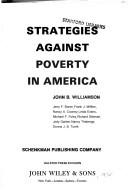| Listing 1 - 4 of 4 |
Sort by
|

ISBN: 0470948833 Year: 1975 Publisher: Cambridge, Mass. Schenkman
Abstract | Keywords | Export | Availability | Bookmark
 Loading...
Loading...Choose an application
- Reference Manager
- EndNote
- RefWorks (Direct export to RefWorks)
Social policy and particular groups --- United States --- United States of America

ISBN: 0521437911 0521372232 0511557787 Year: 1992 Volume: vol *8 Publisher: Cambridge Cambridge University press
Abstract | Keywords | Export | Availability | Bookmark
 Loading...
Loading...Choose an application
- Reference Manager
- EndNote
- RefWorks (Direct export to RefWorks)
This analysis of the growth of welfare spending examines the relative impact of class and status groups versus demographic composition and political structures. Special attention is given to the role of the aged as representative of the importance of ascription and middle-class groups in welfare growth, and to the effect of welfare spending on income inequality. Aggregate cross-national data from the UN, ILO, and the World Bank are analysed and the conclusion is drawn that a large aged population, especially in combination with democratic political processes, is a direct and crucial influence on the level of welfare spending.
Aide sociale --- Aide sociale -- Politique gouvernementale --- Assistance publique --- Assistance sociale --- Benevolent institutions --- Bien être social --- Clubs d'influence --- Corps intermédiaires --- Distribution of income --- Drukkingsgroepen --- Etat providence --- Forces de pression --- Groupements d'intérêts --- Groupements intermédiaires --- Groupes d'intérêts --- Groupes de pression --- Groupes intermédiaires --- Income distribution --- Inequality of income --- Inkomens--Ongelijkheid --- Inkomens--Verdeling --- Inkomensongelijkheid --- Inkomensverdeling --- Inégalité des revenus --- Lobbies --- Oeuvres sociales --- Openbare welzijnszorg --- Openbare welzijnszorg -- Regeringspolitiek --- Poor relief --- Pressiegroepen --- Pression [Groupes de ] --- Pressure groups --- Prestations sociales --- Protection sociale --- Public assistance --- Public charities --- Public relief --- Public welfare --- Public welfare -- Government policy --- Public welfare reform --- Relief (Aid) --- Revenus--Inégalité --- Revenus--Répartition --- Répartition des revenus --- Réseaux d'influence --- Social welfare --- Staat [Welvaarts] --- State [Welfare ] --- Systèmes d'assistance --- Welfare (Public assistance) --- Welfare reform --- Welfare state --- Welvaartsstaat --- 364 --- AA / International- internationaal --- US / United States of America - USA - Verenigde Staten - Etats Unis --- 330.548 --- 336.024 --- 368.40 --- Maatschappelijke hulpverlening --- Nationalisatie. Privatiseringen. --- Sociale begroting, rekeningen en uitgaven. Gezondheid. --- Sociale voorzorg en verzekeringen. Sociale zekerheid: algemeenheden. --- 364 Maatschappelijke hulpverlening --- #SBIB:316.8H00 --- Sociaal beleid: algemeen --- Social policy --- Social conflict --- Older people --- Conflits sociaux --- Personnes âgées --- Political activity --- Activité politique --- Public welfare. --- Welfare state. --- Income distribution. --- Aged - Political activity. --- Pressure groups. --- Nationalisatie. Privatiseringen --- Sociale begroting, rekeningen en uitgaven. Gezondheid --- Sociale voorzorg en verzekeringen. Sociale zekerheid: algemeenheden --- Social Sciences --- Sociology --- Advocacy groups --- Interest groups --- Political interest groups --- Special interest groups (Pressure groups) --- Functional representation --- Political science --- Representative government and representation --- Lobbying --- Policy networks --- Political action committees --- Social control --- Income inequality --- Distribution (Economic theory) --- Disposable income --- State, Welfare --- Economic policy --- State, The --- Welfare economics --- Human services --- Social service --- Political activity. --- Government policy

ISBN: 9780521705554 9780521879729 9780511819391 9780511649288 0511649282 0511334176 9780511334177 0511819390 0521879728 052170555X 1107183995 9781107183995 0511645198 9780511645198 1282389769 9781282389762 9786612389764 6612389761 0511333498 9780511333491 0511574088 9780511574085 Year: 2007 Publisher: Cambridge Cambridge University Press
Abstract | Keywords | Export | Availability | Bookmark
 Loading...
Loading...Choose an application
- Reference Manager
- EndNote
- RefWorks (Direct export to RefWorks)
The idea that science is a blueprint for research, and imagination gives research its life and purpose inspired this comprehensive explanation of research methodology. The authors' decades of experience have revealed that research is a craft requiring judgment and creativity, not simply memorization and application of the rules of science. Whether one is conducting an intimate one-on-one interview or a large-scale examination of an entire society, human imagination and scientific principles of inquiry go hand in hand. To that end, this book emphasizes scientific method, but also acknowledges its critics. It covers a wide variety of data-collection techniques, but presents them as reinforcing rather than competing with one another, thus striking a balance between qualitative and quantitative methods. It is designed for students and instructors who want a comprehensive treatment of a variety of research techniques with special emphasis on qualitative approaches.
Research --- Social sciences --- Social surveys --- Behavioral sciences --- Human sciences --- Sciences, Social --- Social science --- Social studies --- Civilization --- Methodology --- Research&delete& --- Mathematical statistics --- Methodology. --- Social Sciences --- Sociology
Book
Year: 1974 Publisher: Boston, Mass. Little and Brown
Abstract | Keywords | Export | Availability | Bookmark
 Loading...
Loading...Choose an application
- Reference Manager
- EndNote
- RefWorks (Direct export to RefWorks)
| Listing 1 - 4 of 4 |
Sort by
|

 Search
Search Feedback
Feedback About UniCat
About UniCat  Help
Help News
News